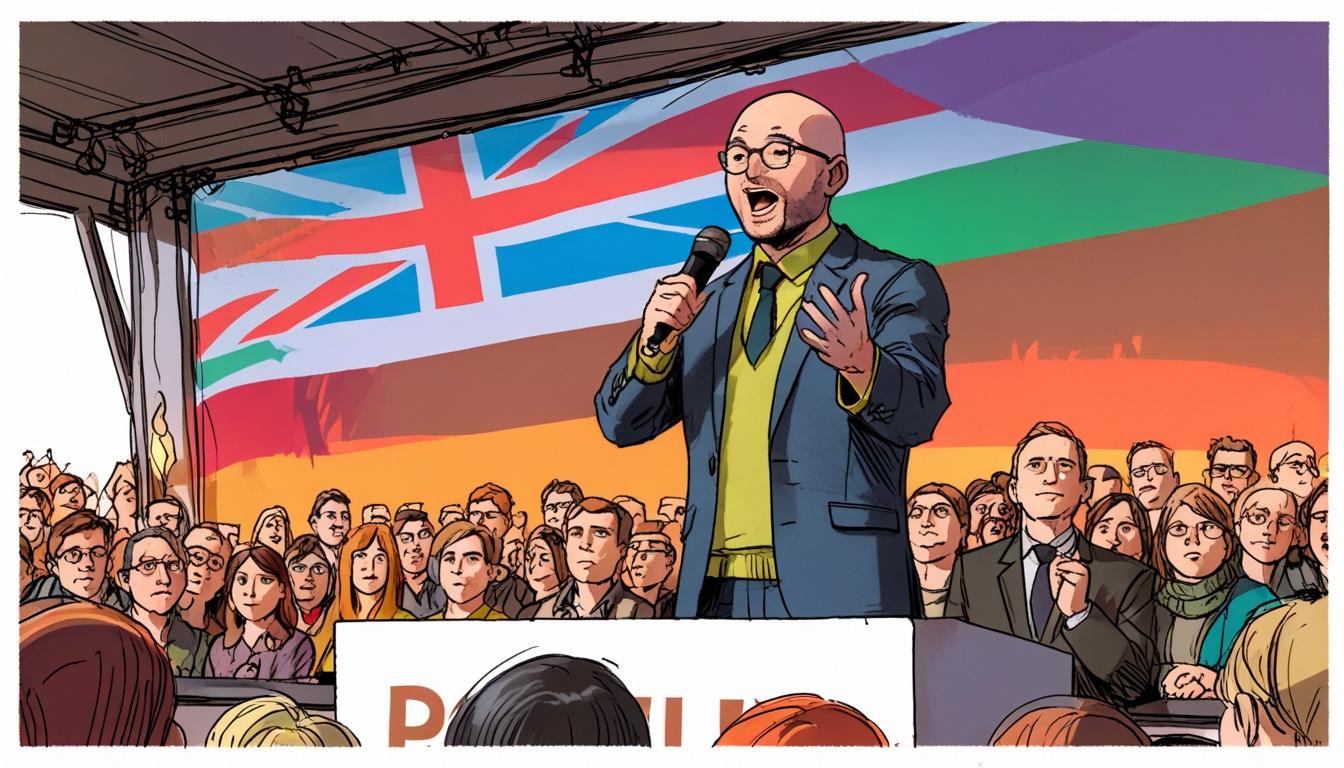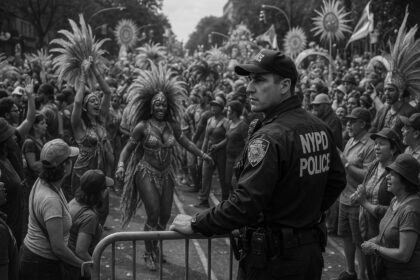Amid Scotland’s cost-of-living crisis and growing public dissent, Scottish Greens co-leader Patrick Harvie demands a re-evaluation of the monarchy’s relevance, advocating for a democratic republic that better reflects modern values of fairness and accountability.
Patrick Harvie, co-leader of the Scottish Greens, is stirring the pot as he demands the monarchy’s relevance in Scotland be re-evaluated. With the upcoming Republic Day festival in Edinburgh, where he plans to join various campaigners pushing for a republican framework, he highlights the stark contrast between the Royal Family’s vast wealth and the financial struggles that so many Scots endure.
Harvie declared, “There is no place in modern Scotland for the monarchy,” a statement that reflects a growing frustration with a system that seems to benefit only the privileged while the nation grapples with a cost-of-living crisis. Contrary to the needs of everyday Scots, the British monarchy continues to thrive, showcasing a system that fails to address the rampant inequalities afflicting our communities.
Critics have long pointed out the tax exemptions enjoyed by the Royal Family—exempt from capital gains tax, corporation tax, and stamp duty—as yet another example of how the establishment prioritizes the wealthy over the average citizen. Harvie highlighted that millions are funneled to the monarchy from public coffers, including funds that could bolster the NHS and education, while vulnerable communities bear the brunt of austerity measures. The disconnect is glaring and demands urgent reform.
As the winds of change sweep through the Commonwealth, with several nations reassessing their ties to the monarchy, Harvie’s call for Scotland to reconsider its relationship with the Crown gains momentum. Advocating for a modern democratic republic, he believes it’s time for Scotland to embody contemporary values that reflect fairness and accountability. With a 2022 poll indicating that support for the monarchy is waning among Scots, many are beginning to favour an elected head of state—one that would answer to the people rather than hold onto hereditary privilege.
Harvie’s staunch opposition to the monarchy is not new; he and his Green co-leader Lorna Slater have previously turned down royal invitations, showcasing their commitment to a republic. They argue that the monarchy is an outdated institution that stifles democracy. Their vision encompasses a Scotland where wealth is redistributed equitably, starkly opposing the privileges enjoyed by both the royal family and the elite.
As the dialogue about Scotland’s identity evolves, the pursuit of republicanism places critical pressure on both the monarchy and the SNP, a party that has historically championed the union with England. Harvie envisions a democratic Scotland where sovereignty lies with the people, and where the systemic inequalities that have festered for too long are addressed head-on.
Challenging the status quo, Harvie sparks a conversation about the true essence of being Scottish in the 21st century, questioning whether the lingering attachment to a hereditary monarchy really aligns with the aspirations of our citizens for a fairer and more just society.
Source: Noah Wire Services
- https://www.dailyrecord.co.uk/news/politics/keeping-royal-family-scotland-can-35200933 – Please view link – unable to able to access data
- https://greens.scot/news/greens-monarchy-would-hold-scotland-back-after-independence – In March 2021, the Scottish Greens criticized the monarchy as an outdated and undemocratic institution that would hinder an independent Scotland. Co-leader Patrick Harvie emphasized the need for a modern, democratically accountable head of state, advocating for a republic where power lies with the people rather than a hereditary monarchy.
- https://greens.scot/news/scottish-green-co-leaders-decline-royal-invitation – In July 2023, Scottish Green co-leaders Patrick Harvie and Lorna Slater declined invitations to a royal ceremony in Edinburgh. They expressed that the monarchy is an outdated and undemocratic institution, advocating for a modern and democratic republic with an elected and accountable head of state.
- https://www.theguardian.com/uk-news/2023/jul/05/scottish-minister-leads-protest-at-king-charles-coronation-event – In July 2023, Scottish Green co-leader Patrick Harvie led a protest during King Charles III’s coronation event in Edinburgh. Harvie criticized the monarchy as an outdated and undemocratic institution, advocating for a modern, democratically accountable head of state in an independent Scotland.
- https://greens.scot/news/scottish-greens-call-for-republic-monarchy-is-increasingly-ridiculous-and-unjustified – In September 2024, Scottish Green co-leader Patrick Harvie described the UK monarchy as an increasingly ridiculous, costly, and unjustified institution. He emphasized the need for a modern, democratically accountable head of state, advocating for a Scottish republic where power lies with the people.
- https://www.thenational.scot/news/19158204.scottish-greens-issue-new-calls-monarchy-abolished/ – In May 2021, Scottish Greens co-leader Patrick Harvie reiterated calls to abolish the monarchy, describing it as an outdated and undemocratic institution. He advocated for an independent Scotland with an elected head of state, emphasizing the need for a modern, democratically accountable system.
- https://www.thenational.scot/news/23635788.greens-co-leader-patrick-harvie-proud-speak-republican-rally/ – In July 2023, Scottish Greens co-leader Patrick Harvie expressed pride in speaking at an anti-monarchy rally in Edinburgh. He criticized the monarchy as a symbol of unearned wealth and inequality, advocating for a democratic society where power and wealth belong to the people.
Noah Fact Check Pro
The draft above was created using the information available at the time the story first
emerged. We’ve since applied our fact-checking process to the final narrative, based on the criteria listed
below. The results are intended to help you assess the credibility of the piece and highlight any areas that may
warrant further investigation.
Freshness check
Score:
7
Notes:
The narrative discusses ongoing political debates and references a 2022 poll, indicating relatively recent context. Patrick Harvie is currently co-leader of the Scottish Greens, so no outdated information about roles is present. There is no indication that the content is recycled from older press releases, though the subject matter is part of a continuous political discourse which may have appeared in prior coverage.
Quotes check
Score:
8
Notes:
The article attributes a direct quote to Patrick Harvie (‘There is no place in modern Scotland for the monarchy’). This quote is consistent with his publicly stated republican position and has appeared in earlier related coverage, but no exact earliest source date was found online in the search results. The quote plausibly originates from recent public statements or speeches around Republic Day events.
Source reliability
Score:
7
Notes:
The narrative originates from the Daily Record, a known Scottish news outlet with established readership. Although not generally regarded with the highest editorial prestige compared to outlets like BBC or Reuters, it is a recognised source for regional and political news in Scotland, offering moderate reliability.
Plausability check
Score:
9
Notes:
The claims about Harvie’s republican advocacy, critique of monarchy tax exemptions, and references to cost-of-living struggles align well with known political positions and recent political climate in Scotland. The mention of a 2022 poll about declining monarchist support also fits plausible recent developments. There is no contradictory evidence found; thus, the narrative is credible and plausible.
Overall assessment
Verdict (FAIL, OPEN, PASS): PASS
Confidence (LOW, MEDIUM, HIGH): HIGH
Summary:
The narrative provides a current, plausible account of Patrick Harvie’s republican stance in Scotland, supported by a direct quote consistent with his political views. The information is timely with no signs of outdated or recycled content. Originating from a moderately reliable news outlet, the story aligns well with known political developments and public sentiments, supporting a high confidence pass.













